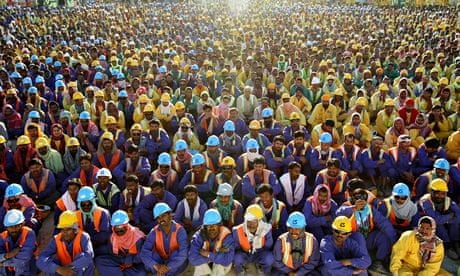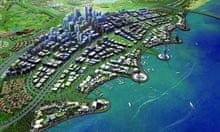The International Trade Union Confederation (ITUC) has called on the United Nations to investigate evidence that thousands of migrant workers in the United Arab Emirates, including those building a new Louvre museum and the world's largest Guggenheim, are treated as slave labour.
The confederation has called on the UN's International Labour Organisation (ILO) to investigate the welfare of workers on a $27bn (£16.6bn) complex of museums and luxury resorts in Abu Dhabi, and the conditions faced by other migrants employed in construction and domestic work across the UAE, because with "alarming frequency [they] are trapped in exploitative practices that may amount to forced labour".
It is understood the formal complaint warns that the Gulf state, which is a member of the ILO, "is in serious breach of its legal obligations" under the convention concerning forced labour, which it ratified more than 30 years ago.
The confederation adds that the country "fails to maintain a legal framework adequate to protect the rights of migrant workers" consistent with the convention and an amendment passed this year requiring signatories to enforce the suppression of forced labour.
The move comes after an Observer investigation found evidence that Abu Dhabi's Tourism Development and Investment Company (TDIC), which manages the development of luxury resorts and three major museums on Saadiyat, is failing to uphold its own employment policies, with workers left destitute, confined to their quarters and sent home for taking strike action. Migrant labourers building New York University's Abu Dhabi campus on the island, under a separate lucrative deal with the emirate's government, were found to be suffering even worse mistreatment.
Sharan Burrow, general secretary of the confederation, said migrant workers' conditions in the UAE and the rest of the Gulf were an "international scandal".
She said migrant workers in the UAE found themselves in effect trapped in the country as they were not allowed exit visas and often racked up substantial debts as a result of paying supposedly illegal recruitment fees, but employers were not prosecuted despite breaching domestic law and the ILO labour rules.
"Right throughout the Gulf there is the degradation of the rights of human beings," said Burrow. "This is an employment arrangement that can only be described as evil. It's an environment where people feel comfortable owning the destinies of other human beings.
"The level of violence and sexual assault [against domestic workers in the UAE] is incredible. If they're impregnated by their employers they are jailed."
Azfar Khan, head of policy at the ILO, said the root cause of the problem was the failure of the UAE and other Gulf states to abolish the kafala system that ties migrant workers to their employers; many workers arrive heavily in debt, having paid huge sums to middlemen to secure contracts.
He said: "There have been many pronouncements about 'reforming' the kafala from the Gulf states governments, but that is like saying that slavery should be reformed or forced labour practices should be reformed. In 2009-10, the ILO conducted a survey of migrant workers' living and working conditions and found, in the case of the UAE, that every single worker interviewed – in a sample of 1,200 – had his or her passport taken by the employer. In the majority of cases it was established that workers were required to work, under threat, longer hours than stipulated in the labour law. And this happens simply because the kafala is given precedence over the [national and international] labour law."
British artist Guy Mannes-Abbott of Gulf Labor, a campaign group of international artists that provided evidence to the confederation of the exploitation of migrant workers on Saadiyat, said: "Having witnessed these abuses myself over the last four years, there is now an urgent need for international bodies and law to confront the appalling exploitation of trapped construction workers on Saadiyat island, throughout Abu Dhabi and beyond."
"TDIC, Abu Dhabi's master developers for Saadiyat, have themselves done nothing: no research or serious investigations, nor have they taken any meaningful actions. I was told by a TDIC official this March that only one Saadiyat worker has had their recruitment fee reimbursed."
The TDIC said the confederation's complaint was a matter for the UAE government. The ministry of labour was unavailable for comment.
The most recent independent audit of conditions on Saadiyat island by accountants PricewaterhouseCoopers, commissioned by the TDIC, found that most workers were paying recruitment fees to secure their jobs in breach of employment rules, and some had their wages and passports withheld for up to six months. Hundreds of workers were moved from slum-like camps to the TDIC's Saadiyat Accommodation Village, which has cricket grounds, a library and a coffee shop, following publication of the report and the Observer's investigation.
The confederation will present its complaint to the ILO's governing body in the autumn. The United Nations body will then decide whether to launch an investigation.
The confederation made a similar complaint in 2013 about the abuse of workers in neighbouring Qatar, which led the ILO to launch an investigation into the state where hundreds of migrant workers have died over the past two years amid a construction boom in the run up to the 2022 World Cup. The ILO published two reports earlier this year calling on Qatar to review the kafala system and allow migrant workers to more easily form unions to bargain for better wages and conditions.

